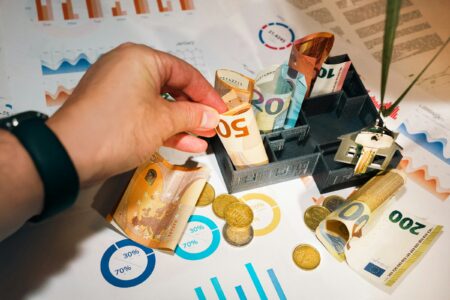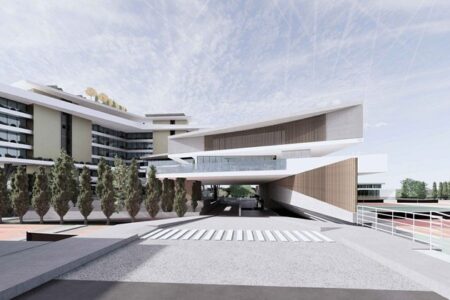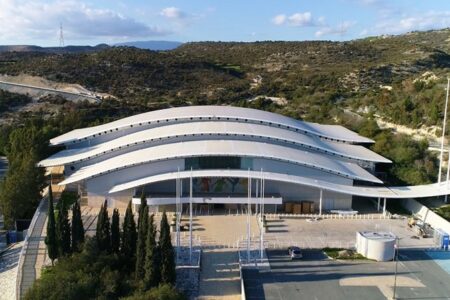25.01.2022
Despite the dangers and constant challenges associated with the persistence of the pandemic crisis at home and in the world, the Cypriot economy, with its high resilience and impressive dynamics, continues to recover rapidly and enters the path of sustainable development. Taking advantage of the opportunities created, such as harnessing the resources of the Recovery Fund, continuing reforms and returning Cyprus to the international investment map, is an important bet.
The use of public real estate as the country’s most important development asset can play a critical role in these efforts, acting as an accelerator of economic growth and as a positive social impact multiplier for local communities and citizens.
It is an undeniable fact that for many decades the image of public real estate has been one of abandonment, indifference and depreciation. Temporary constraints do not help find long-term sustainable solutions for iconic sites that remain unused, such as the State Fair.
To make the best use of this opportunity, it is necessary to implement a strategy that puts public real estate above any micropolitical aspirations, promoting the interests of Cyprus taxpayers and creating a strong social footprint for local communities. A strategy based on constructive cooperation with all stakeholders at the national and local levels and providing an atmosphere of transparency and trust for the entire domestic and international investment community. However, the strategy should not be limited to concession and development projects, but should also be extended to a range of existing public or private leases so that contracts can be updated to reflect actual market data as well as contemporary needs of the population.
On March 4, 2014, the House of Representatives of the Republic of Cyprus passed the Privatization Regulation Law (the “Privatization Law”), which establishes the legal and institutional framework that allows the use of state property.
However, in the area of the old Larnaca airport, there are pictures of abandonment that cause only melancholy and sadness. For more than a decade, no interest or initiative on the part of the investor in the development of the old airport, which is located at a key point in Larnaca, despite the large salt lake, could not bear fruit.
The premises of the National Exhibition of Cyprus cover a total area of 32,720 square meters of indoor and outdoor exhibition space. This is an obsolete area in an unused state.
On the other hand:
Pillar of development in Limassol
The beautiful building for Limassol and Cyprus, specially designed to serve the largest cruise ships in the world, featured a new passenger terminal, said Charles Meeby, CEO of DP World Limassol. Speaking to Business Limassol, Mr. Mebi stressed that the new terminal could become an important pillar of economic growth, creating new opportunities and prospects for Cyprus. “The cruise industry is a top priority for DP World Limassol and with the launch of the new passenger terminal, the company aims to make Limassol a base port and an attractive choice for cruise lines,” he added.
The Nicosia Municipality has informed the public in a statement that the renovation work in the old GSP area will start on November 10th, and during the construction work, which is expected to last 24 months, there will be no possibility to park vehicles in the old area of the square.
The project provides for the creation of an underground parking with a capacity of more than 500 cars. A city square, green spaces and recreation areas will also be created.
In the spirit of cooperation and hard work, the joint development of the port and marina of Larnaca will be a strong development pole not only for the city of Zenon, but for the whole of Cyprus, said Panos Alexandrou, CEO of Kition Ocean Holdings.
The old Nicosia General Hospital was the main one in Cyprus from 1936 to 2006. In 2006, the patients were transferred to the New Nicosia General Hospital. It was demolished in 2010. Since then, it has been an unused area where construction of the National Museum of Cyprus has recently begun.
HRDH in Greece is implementing a very ambitious program to use private public property in a way that, on the one hand, will make a decisive contribution to the reduction of public debt, and on the other hand, will create a basis for resuming the development process in the country with multiplier advantages for the economy.
A brilliant example can be found in Athens, it concerns the use of the space of the former airport in Elliniko. The former Hellinicon International Airport covers 5,300 acres, of which 4,010 acres are expected to be occupied by Metropolitan Park, 1,000 acres are expected to be used for urban development, and the remaining 290 are new infrastructure or existing facilities. Investments in Elliniko include the development of various infrastructures and facilities, such as residential areas, hotels, shopping centers and shops, theme parks, museums of art and culture, open cultural spaces, wellness centers, sports and entertainment areas, research centers, as well as a complete modernization of the existing marina and coastal area with free access to all.
The contribution of investments in Elliniko to the national economy through the development of tourism will be great. This is an important step in the direction of investment, employment, use of new opportunities and attraction of new capital to Greece. The project will have numerous positive effects in other sectors and activities, will create new know-how and in a wider area will be of great useful value to millions of Greeks and foreign citizens. However, above all, these investments, due to their size and quality characteristics, will add a significant axis of growth to the country’s economy through the development of tourism. This is an important step in the direction of investment, employment, use of new opportunities and attraction of new capital to Greece.
State real estate can be the main source of funding for any state. In the past, most efforts to use Cyprus real estate have been neglected, mainly due to bureaucracy, but also due to the prevailing lack of transparency in operations. One way to exploit real estate would be to create a single body that would control all public real estate and be politically independent. The main activity of this body will be the immediate registration of state real estate, the resolution of legal and urban planning issues immediately and legally, as well as ensuring the transparency of future tenders for real estate development.
Cyprus could organize open international tenders for part of the property to win long-term concessions for interested rental investors. Cyprus has real estate that can be exploited and made a profit. Part of the property could, after a preliminary assessment by independent, reliable appraisers, be bought out by investors for the development of large residential and / or commercial complexes, which will be sold or rented out.
The government can provide tax incentives to investors for the development of real estate owned by the government of Cyprus. Thus, it is possible to use both urban and suburban real estate.
We could follow the example of Portugal, which reclaimed 3,500 acres of public land in Lisbon by turning it over to a state-owned company. EXPO facilities were built on this territory, and most of it was divided into commercial and residential areas under a special regime.
In addition to the above, a scheme for the joint operation of state real estate with individuals can be created. An example of such a development scheme is the port and marina of Limassol, as well as other marinas and ports in Cyprus, as well as the new Larnaca Airport.
It is worth noting the attractive corporate taxation and the philosophy of Cyprus, which is characterized as ideal. In a public property promotion program, additional incentives could be provided to potential investors, such as Qatar’s intention to invest in a plot of public land in Nicosia opposite the Hilton Hotel (which, unfortunately, never happened).
Much of the government real estate is land occupied by several National Guard camps, which in some cases may have been transferred as they were found over time in central locations in cities, resulting in:
a) a negative impact on their functionality;
b) that the land they occupy cannot be used, and thus the government cannot make the most of their value.
In conclusion, the use of state property can bring very positive results in the Cyprus market. With the right strategic planning, this will stimulate the market and the economy. For many market participants, the use of state-owned real estate is currently the only way to raise capital, both from local and international institutional investors. First of all, of course, it is necessary to establish an appropriate institutional framework and create a unified plan and an appropriate implementation policy. If modern and proven international practices are adopted, such exploitation of public real estate will significantly contribute to the reduction of public debt and the radical further rational development of the Cypriot economy.
* Panos Danos is a member of the Royal Institute of Certified Valuers, a certified real estate appraiser and CEO of the DANOS Group, an international real estate consultant and appraiser. He has experience as a real estate development consultant in Greece, Cyprus and the Balkans.
















